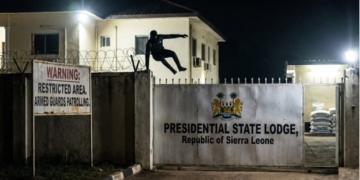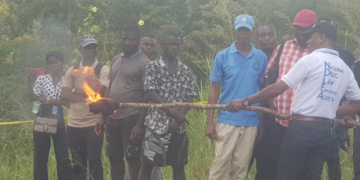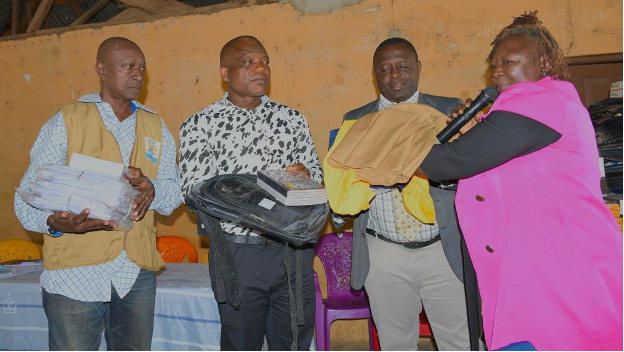By Alpha Amadu Jalloh,
While every man and woman under the sun craves a better life, hoping for fortune, fulfillment, and significance, life seldom unfolds as we dream. Dreams are not always destinations. And sadly, it is not always the deserving who achieve greatness. Often, the best opportunities land in the hands of those who lack the humility, wisdom, or empathy to steward them for the common good.
Today, Sierra Leone finds itself caught in a web of misplaced loyalty and manipulated narratives. In the heart of our political and social corridors, there stands a man; let’s call him Senior Man. A man decorated with titles, cloaked in influence, and granted a seat at the highest tables. He is the presidential adviser, the chairman of everything and anything, the village son who left and returned adorned with the glitter of political power.
Yet, in all his ascent, Senior Man has become a prisoner of ambition. Blinded by his ego, he seeks one final crown to be the village champion. Not out of service, not out of compassion, but out of a deep-seated belief that he deserves it. That he alone can lead. That the village owes him.
The problem, however, is that fate has long moved on. Despite all the privilege afforded him, from education to appointments, from political connections to national platforms, Senior Man forgot the most important lesson of leadership: humility. When the village drums beat for him in years past, when his people called on him to represent their voices, he turned away. He was too big to dance to their rhythm. Too important to grace the village square. Too occupied with shaking hands in capital halls to dirty his shoes on village soil.
He thought leadership was owed, not earned. He thought proximity to the president meant ownership of the people’s trust. He believed that respect could be demanded rather than inspired.
But leadership in Sierra Leone, especially at the village level, is not conferred by title. It is earned in the trenches of service. It is forged in the furnace of shared hardship. Our people can tell the difference between a man who walks with them and a man who walks over them.
Now, after years of absence, Senior Man returns to the village square, not with a humbled heart, but with a bruised ego and loud declarations. He sings, he dances, and he throws tantrums, hoping to regain the spotlight. He tries to rewrite history with slogans and handouts. But the village sees through the performance.
They have already found their champion. He may not wear tailored suits or speak in polished English. He might be a cobbler, a carpenter, or a man whom the Senior Man once mocked as unfit for anything but manual labor. He may have no connections in Freetown, but he has something Senior Man lost: trust. The villagers can sit with him under the mango tree and not be spoken down to. They can share their fears without fear of mockery. They see in him not just a man of words, but a man of deeds.
The senior man cannot understand how the village champion could be someone so ordinary. But he fails to see that it is that very ordinariness that draws the people in.
The real champion never asked for a title. He never claimed a monopoly over wisdom or solutions. He simply showed up, again and again, when his people needed him. He didn’t strut in with proclamations or hide behind protocols. He listened. He acted. He stayed.
The senior man had every chance. The doors of opportunity were flung open for him. But power, when unchecked, breeds arrogance. And arrogance, when left unchallenged, leads to downfall. He thought the village would wait forever. He thought the chair of influence would be enough. But village loyalty is not bought with noise or intimidation.
Now, as he attempts to silence others, to diminish the contributions of those he once ignored, the truth remains: the title of village champion has already been awarded.
This moment in Sierra Leone reflects our broader struggle. Too many senior men exist in our systems, individuals who confuse access with ability, entitlement with merit, and position with purpose. They do not build; they dominate. They do not lead; they command. They mistake fear for respect.
But the people are changing. Our villagers, both literal and metaphorical, are learning to identify authenticity. They are tired of being used as stepping stones. They are wary of empty speeches and ego-driven campaigns.
We no longer want leaders who seek the spotlight more than service. We no longer applaud those who belittle others to elevate themselves.
Senior Man, the time has passed. The drums are now beating for another. You missed your moment not because of fate, but because of pride. And as the saying goes, Pride goes before destruction, and a haughty spirit before a fall.
So let this be a message not just to one man, but to many. To every politician, every would-be leader, every man or woman who believes the people are tools for personal ambition: the village is watching. The people are deciding.
You cannot impose yourself as their champion. You must be chosen by presence, by humility, and by consistent and tireless commitment.
Power is not your inheritance; it is a sacred trust. And in Sierra Leone, where too many have suffered from the weight of broken promises, that trust must never again be taken lightly.
Let Senior Man be a cautionary tale. And let our future champions rise not by manipulation, but by merit. Let the village decide.






















